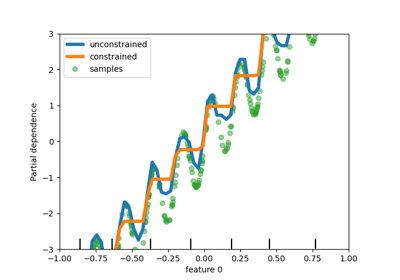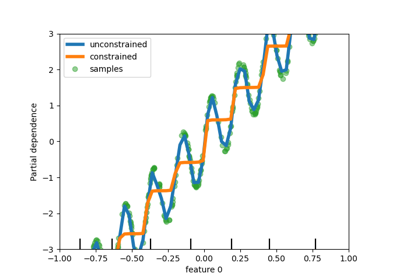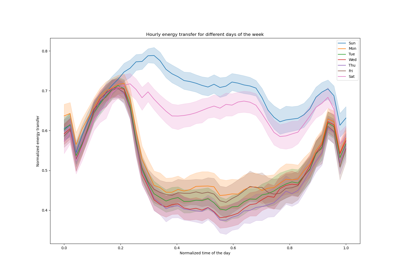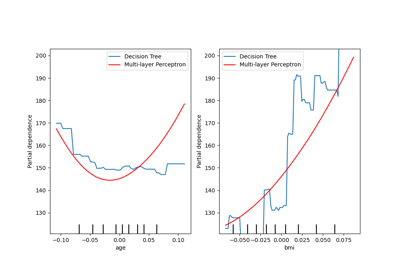注意
转到末尾 下载完整的示例代码或通过 JupyterLite 或 Binder 在浏览器中运行此示例。
单调性约束#
此示例说明了单调性约束对梯度提升估计器的影响。
我们构建了一个人工数据集,其中目标值通常与第一个特征呈正相关(具有一些随机和非随机变化),并且通常与第二个特征呈负相关。
通过在学习过程中分别对特征施加单调递增或单调递减约束,估计器能够正确地遵循总体趋势,而不是受制于变化。
此示例的灵感来自 XGBoost 文档。
# Authors: The scikit-learn developers
# SPDX-License-Identifier: BSD-3-Clause
import matplotlib.pyplot as plt
import numpy as np
from sklearn.ensemble import HistGradientBoostingRegressor
from sklearn.inspection import PartialDependenceDisplay
rng = np.random.RandomState(0)
n_samples = 1000
f_0 = rng.rand(n_samples)
f_1 = rng.rand(n_samples)
X = np.c_[f_0, f_1]
noise = rng.normal(loc=0.0, scale=0.01, size=n_samples)
# y is positively correlated with f_0, and negatively correlated with f_1
y = 5 * f_0 + np.sin(10 * np.pi * f_0) - 5 * f_1 - np.cos(10 * np.pi * f_1) + noise
在没有约束的情况下,在此数据集上拟合第一个模型。
gbdt_no_cst = HistGradientBoostingRegressor()
gbdt_no_cst.fit(X, y)
在具有单调递增 (1) 和单调递减 (-1) 约束的情况下,在此数据集上拟合第二个模型。
gbdt_with_monotonic_cst = HistGradientBoostingRegressor(monotonic_cst=[1, -1])
gbdt_with_monotonic_cst.fit(X, y)
让我们显示预测对这两个特征的部分依赖性。
fig, ax = plt.subplots()
disp = PartialDependenceDisplay.from_estimator(
gbdt_no_cst,
X,
features=[0, 1],
feature_names=(
"First feature",
"Second feature",
),
line_kw={"linewidth": 4, "label": "unconstrained", "color": "tab:blue"},
ax=ax,
)
PartialDependenceDisplay.from_estimator(
gbdt_with_monotonic_cst,
X,
features=[0, 1],
line_kw={"linewidth": 4, "label": "constrained", "color": "tab:orange"},
ax=disp.axes_,
)
for f_idx in (0, 1):
disp.axes_[0, f_idx].plot(
X[:, f_idx], y, "o", alpha=0.3, zorder=-1, color="tab:green"
)
disp.axes_[0, f_idx].set_ylim(-6, 6)
plt.legend()
fig.suptitle("Monotonic constraints effect on partial dependences")
plt.show()

我们可以看到,无约束模型的预测捕获了数据的振荡,而受约束的模型遵循总体趋势并忽略了局部变化。
使用特征名称指定单调性约束#
请注意,如果训练数据具有特征名称,则可以通过传递字典来指定单调性约束
import pandas as pd
X_df = pd.DataFrame(X, columns=["f_0", "f_1"])
gbdt_with_monotonic_cst_df = HistGradientBoostingRegressor(
monotonic_cst={"f_0": 1, "f_1": -1}
).fit(X_df, y)
np.allclose(
gbdt_with_monotonic_cst_df.predict(X_df), gbdt_with_monotonic_cst.predict(X)
)
True
脚本总运行时间: (0 分钟 0.529 秒)
相关示例



